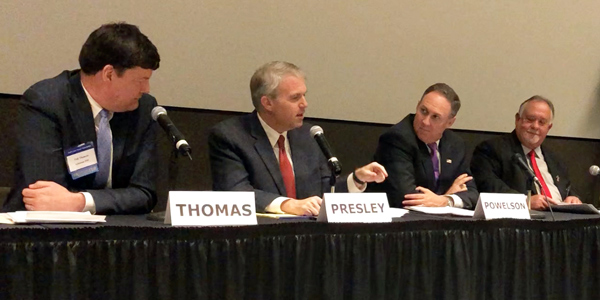By Rich Heidorn Jr.
NEW ORLEANS — Regulators from Arkansas, Mississippi and Louisiana competed last week to heap scorn on Energy Secretary Rick Perry’s bid to boost coal and nuclear plants while praising FERC’s rejection of the Notice of Proposed Rulemaking.
The remarks came during a panel discussion with FERC Commissioner Robert Powelson at the Gulf Coast Power Association’s MISO South regional conference Feb. 8.
“When the administration chooses to protect coal — and omits the major fact that gas produced by fracking competes with coal — it’s political malpractice that puts my ratepayers at risk,” said Republican Ted Thomas, chair of the Arkansas Public Service Commission and the Organization of MISO States. “And it hacks me off.”
“A lot of time we [on the Louisiana Public Service Commission] don’t all agree,” said Commissioner Mike Francis, a Republican. “This particular issue gave us quite a bit of heartburn, and we unanimously objected.”
Louisiana regulators and the Mississippi Public Service Commission filed joint comments with FERC in October saying Perry’s proposal was based on unsupported conclusions, would harm ratepayers, undermine competition and intrude on state jurisdiction.
“This is hypocrisy run amuck,” said Mississippi PSC Chairman Brandon Presley, the lone Democrat on the panel. “How long have we been hearing about ‘Let’s make these decisions on the local level, get big government out of our lives.’ … And all of the sudden, in 15 days we’re supposed to upend the markets.
“I represent the poorest counties in the poorest state in the United States of America, and they don’t need this type of deal,” he continued. “They don’t understand why they should prop up an industry.”
Powelson said the stakes for FERC were clear when the commission voted unanimously to reject the NOPR and create a new docket to examine grid resiliency. (See FERC Rejects DOE Rule, Opens RTO ‘Resilience’ Inquiry.)
“We either stand for … organized markets and the rule of law, or we don’t,” Powelson said. “We stood our ground, demonstrated to everyone in this room that regulatory certainty is alive and well at 888,” a reference to the address of FERC headquarters.
Powelson criticized some fuel partisans for “creating a lot of hysteria” in questioning the reliability of natural gas generation.
“I had to correct someone in my office [who said] that gas is not a baseload resource,” he said. “Now if you say that in Louisiana or Texas or Pennsylvania, they’re fighting words.”
‘Black Swan’ Events
Thomas said planning for high-impact, low-frequency “black swan” events is “one of the most difficult things to rationally deal with.”
“There should be regional differences with respect to this because different regions have different threats. Minnesota doesn’t need to pay a bunch of money for [protection from] hurricanes. California doesn’t need to pay a bunch money for [protection from] tornadoes,” Thomas said. “If you’re in the ice cream business, you have a different view than [if] you’re in another business. And to me this is the one place where microgrids actually make some sense — that if people need extra reliability then they can come up with a way to pay for it without changing the standard for everybody. So, your hospitals and folks that need it — there ought to be ways for them to bear that cost rather than spreading it around.”
Bear: No Resilience Problem in MISO
Speaking earlier, MISO CEO John Bear said the RTO is still developing its response to FERC, but it doesn’t expect major changes because state regulators and RTO members have ensured resilience through integrated resource planning.
“We don’t have a resilience problem. … We’re in a really good position right now as a region because of the hard work those folks have done. So I don’t think they need to come in and put anything in that’s significantly different from what we have today.”
However, Bear said MISO and its neighbors should improve their seams coordination to help the grid when it is “under stress” from severe weather.
“How those seams operate, the seams agreements and the way we use transmission, the way we dispatch between us … I think that’s the area where we really need to focus so that we’re all working together when those situations occur, as opposed to everybody’s looking inside their own tent and maybe working against each other.”
Tipping Point for Renewables?
In response to a question, Powelson said FERC may have to consider whether state renewable portfolio standards, subsidies for nuclear plants and incentives for offshore wind could reach a “tipping point” and begin to undermine wholesale markets.
“If you would have told me that a combined cycle gas plant with a 6,600 heat rate is facing problems in a market like California with renewables ramping up and that gas resource being dispatched [down] and not being able to handle marginal costs in that market, I would never have imagined that scenario,” Powelson said. “So it is something that is on our radar screen. … Over the next five years I think there will be some friction points going forward for us.”
Powelson also said the commission should reconsider whether capacity market incentives are properly designed. “Is a three-year [forward] capacity auction like PJM — does that really incent an investment, or should we be looking out five years in that construct?” he asked. “That’s a debate that I’ve teed up within the [FERC] building.”







